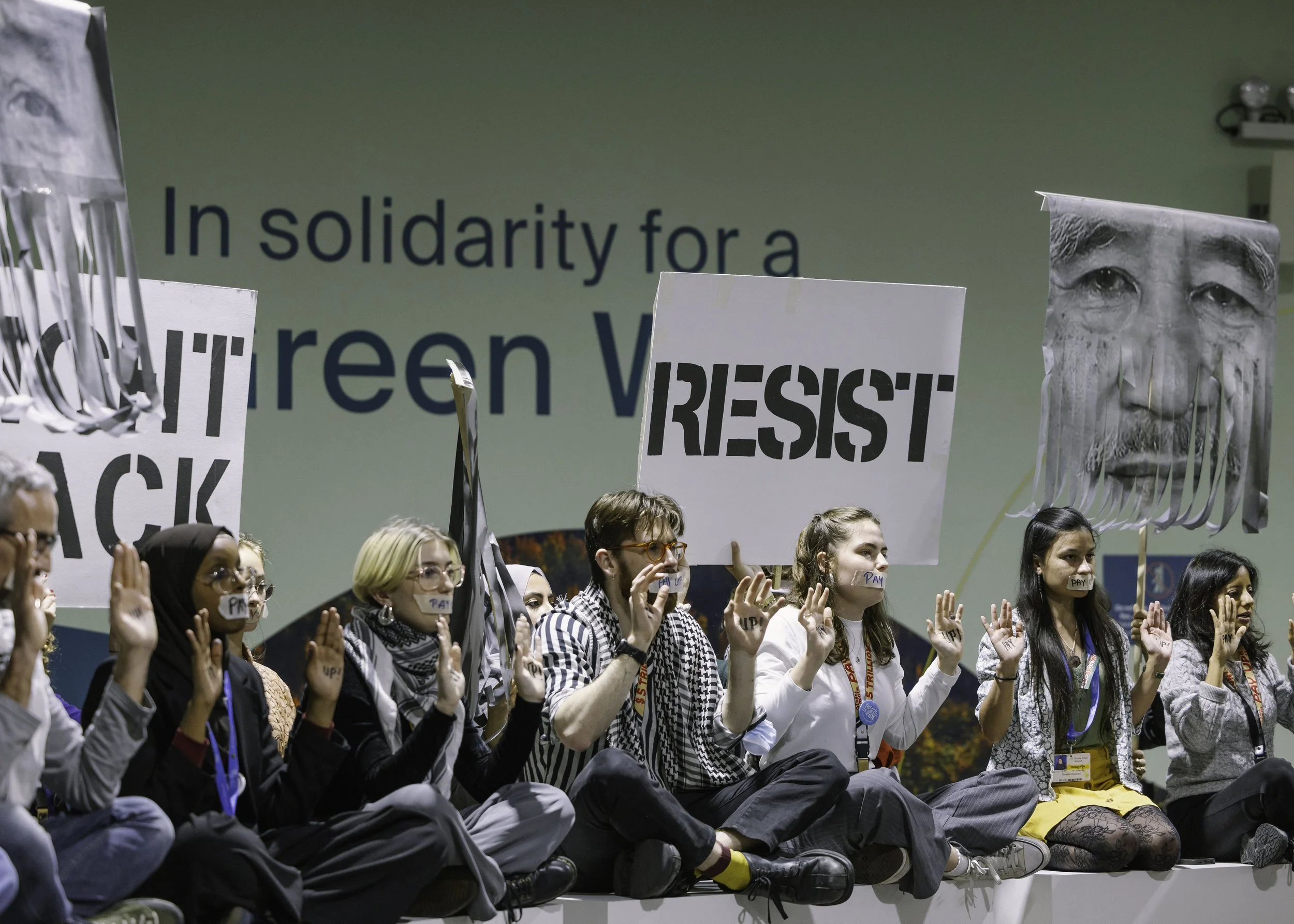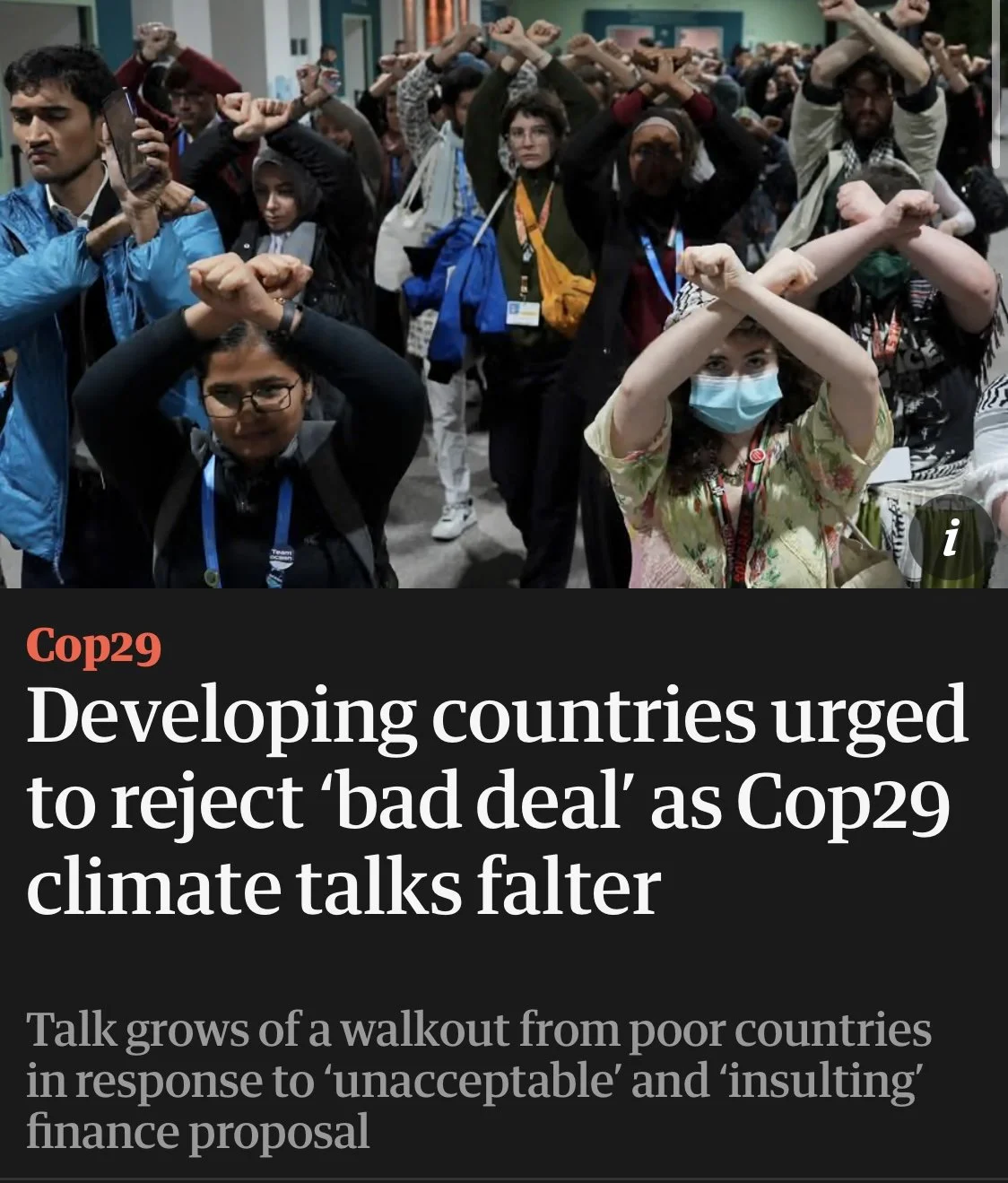My learnings from a failed COP (we can do better).
This article was originally released as an edition of my newsletter. Receive future dispatches.
COP26 taught me the power of letting anybody do what they want.
Three years ago, I travelled to Glasgow for my first COP on the “rail to COP” from Brussels. There, realising that activists at COP needed a platform to mobilise on, I scampered up and down the train adding people to a Signal groupchat for activists at COP. This helped to fill me with anticipation for what we could achieve together.
Over the course of the first few days of COP, this anticipation morphed into frustration because I was totally at a loss at what I should be doing. There were powerful people everywhere, media everywhere, but what exactly was I supposed to do? Then, on day three, the ever-impressive Fatima Ibrahim (who Co-founded Green New Deal Rising in the UK) sent a message to a groupchat saying that she was on the train to Glasgow, she wanted to organise an action against Rishi Sunak, and who would be up for helping organise it? So a random group of mostly strangers sat down on the floor somewhere in the conference centre and hashed out a plan.
The action itself was a bit of a mess - we repeatedly broke the UN rules on protesting while failing to garner any media coverage to my knowledge. The speakers weren’t decided in advance, with whoever was interested instead taking turns in speaking to the passers by. But what the action did create was a sense of purpose in me, and a momentum for DIY action organising among the activist community as whole. Throughout the conference, people would use this random group chat of a few hundred people to gather interested people together and organise actions. It was messy but also exciting and, crucially, empowering.
COP29 could not have been more different.
I’m only aware of one time that a random group of people created an open call for anyone to help them organise an action - it happened when us the Young European Greens and Global Young Greens organised an action against human rights abuses, indirectly pointing the finger at Azerbaijan as COP host. Instead, actions were organised within pre-existing groups or networks of groups. To some degree it is fair enough to organise a protest with the people you know. But when that is the only way that actions are organised, taking action becomes more exclusive. If you didn’t already have the knowledge, materials and connections to organise an action in COP - which is an exceptionally weird space for anybody - then the best you could hope would be to help hold a banner and join in some chants. One NGO, needing stewards for an action, actively refused the help of some of my friends because they didn’t know them.
So why did this happen?
The obvious explanation is that Azerbaijan is a repressive regime which has largely eradicated civil society in the country and severely restricted civil liberties and human rights in the country, creating a lack of connections to local activists, and a general sense of fear among foreign attendees that they could face infilitration and repression.
But it’s not that simple. Egypt has a similarly repressive regime, and yet during COP there was widespread DIY activism, largely centred around a civil society space in an open air nightclub that anybody with a COP observer badge could enter. The difference is that Egypt hosted COP in Sharm El-Sheikh, a hellish mega resort in the desert with no local population except for service workers who are bused in from Cairo and elsewhere to serve the tourists. This meant that, unlike in Baku, there would be almost no risk that allowing such a civil society space would facilitate cross-pollination between local activists and the activists at COP.
At COP29, we were most effective when we embraced collective action. In the last three days, open plenaries were organised by civil society. All observers were allowed to join, to share intel, and organise actions. Out of this we decided to organise a silent march through the venue, with our arms above our heads telling member states to say “no” to the deal on the table. This was headline news.
Collective intelligence created the most mediatic action of the conference.
The United Nations repressed activists.
If the UN has a million fans, then I am one of them. If the UN has ten fans, then I am one of them. If Doublelift has only one fan then that is me. If Doublelift has no fans, then that means I am no longer on earth. If the world is against Doublelift, then I am against the world. (Okay it’s not perfect but who care about nuance, honestly.)
But at this COP, the United Nations security did the dirty work of the dictators by repressing activists inside. While the Azerbaijani regime banned protests outside, the UN only allowed a silent march inside the conference centre - and out of the way of the media. When we spontaneously did a silent march for a second time, they filmed us and tried to find out who the organisers were. When a Philippino comrade complained about the UN security during a protest, they banned him from the venue.
Get the latest changemaking strategies in your inbox.
And we all stayed silent about it.
One effect of activism being centred around existing networks of NGOs that have deep pockets, wide networks and high value brands is a deradicalisation of the space. Not only are they generally less radical than more grassroots groups, but they also have too much to lose if they get chucked out and banned from joining future COPs.
I was keen to break the repressive rules of the UN, and so were many of the Young Greens there. Individually, we are willing to miss COPs in the coming years, and nobody would particularly notice if the Young Greens were not at COP30. But we didn’t do so because such a unilateral initiative would be contrary to the spirit of solidarity we have within civil society. So, seeing an unwillingness from almost anyone to break the rules, we stayed quiet.
There is another reason that the activism at COP lacked radicality and grassroots initiative: because too many radical, grassroots activists are boycotting COP.
This is the paradox of the left’s misguided boycott logic: the more you boycott a space because you don’t like it, the more bad it becomes. The boycotters then point at how bad the thing they’re boycotting is and say they were right to boycott it, even if their boycotting helped to make it so bad. This is true for Twitter, and it’s also true for COP. So, as I process my frustration about another political failure of a COP, I am already working out how I can scrape enough money together to get to Brazil for COP30.
Speak soon,
Sean
The COP29 people’s plenary - a powerful movement tradition.


